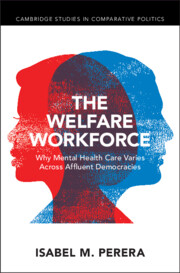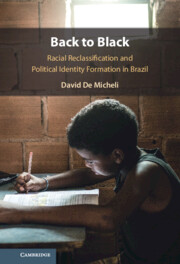Refine search
Actions for selected content:
46 results
Administrative Burden’s Mass Political Effects: How the Administration of Medicaid and Elections Shapes Mass Voter Turnout
-
- Journal:
- Perspectives on Politics , First View
- Published online by Cambridge University Press:
- 09 December 2025, pp. 1-23
-
- Article
-
- You have access
- Open access
- HTML
- Export citation
Undermining Clientelism with Collective Confidence: Unbundling the Individual and Spillover Effects of Conditional Cash Transfers
-
- Journal:
- Latin American Research Review ,
- Published online by Cambridge University Press:
- 06 October 2025, pp. 1-23
-
- Article
-
- You have access
- Open access
- HTML
- Export citation
1 - Introduction
-
- Book:
- Through the Roof
- Published online:
- 28 August 2025
- Print publication:
- 11 September 2025, pp 1-27
-
- Chapter
- Export citation
Political alienation among basic income support recipients in Germany: the role of social exclusion and experiences with welfare state institutions
-
- Journal:
- Journal of Social Policy , First View
- Published online by Cambridge University Press:
- 03 July 2025, pp. 1-20
-
- Article
-
- You have access
- Open access
- HTML
- Export citation
Race, Citizenship/Immigration Status, and Contact with the Welfare State
-
- Journal:
- Journal of Race, Ethnicity and Politics , First View
- Published online by Cambridge University Press:
- 04 February 2025, pp. 1-23
-
- Article
-
- You have access
- Open access
- HTML
- Export citation
1 - The Welfare Workforce
-
- Book:
- The Welfare Workforce
- Published online:
- 02 January 2025
- Print publication:
- 16 January 2025, pp 1-28
-
- Chapter
-
- You have access
- Open access
- HTML
- Export citation
7 - Beyond Deinstitutionalization
-
- Book:
- The Welfare Workforce
- Published online:
- 02 January 2025
- Print publication:
- 16 January 2025, pp 186-201
-
- Chapter
-
- You have access
- Open access
- HTML
- Export citation

The Welfare Workforce
- Why Mental Health Care Varies Across Affluent Democracies
-
- Published online:
- 02 January 2025
- Print publication:
- 16 January 2025
-
- Book
-
- You have access
- Open access
- Export citation
Cross-Domain Policy Feedback: The Institutionalization of Collective Bargaining Rights for Health Care Workers
-
- Journal:
- Journal of Policy History / Volume 36 / Issue 4 / October 2024
- Published online by Cambridge University Press:
- 22 November 2024, pp. 342-364
-
- Article
-
- You have access
- Open access
- HTML
- Export citation

Back to Black
- Racial Reclassification and Political Identity Formation in Brazil
-
- Published online:
- 14 November 2024
- Print publication:
- 17 October 2024
Executive action that lasts
-
- Journal:
- Journal of Public Policy / Volume 44 / Issue 2 / June 2024
- Published online by Cambridge University Press:
- 10 January 2024, pp. 344-365
-
- Article
-
- You have access
- Open access
- HTML
- Export citation
Policy feedback and income targeting in the welfare state
-
- Journal:
- Journal of Social Policy / Volume 54 / Issue 4 / October 2025
- Published online by Cambridge University Press:
- 30 November 2023, pp. 1206-1224
- Print publication:
- October 2025
-
- Article
-
- You have access
- Open access
- HTML
- Export citation
Crossed wires: Understanding policy feedback in varying policy environments
-
- Journal:
- Journal of Public Policy / Volume 44 / Issue 2 / June 2024
- Published online by Cambridge University Press:
- 17 November 2023, pp. 229-257
-
- Article
-
- You have access
- Open access
- HTML
- Export citation
4 - Organizational Culture and Policy Support
-
- Book:
- Equality Unfulfilled
- Published online:
- 06 July 2023
- Print publication:
- 20 July 2023, pp 105-137
-
- Chapter
- Export citation
2 - Using Survey Data to Study Policy Support
-
- Book:
- Equality Unfulfilled
- Published online:
- 06 July 2023
- Print publication:
- 20 July 2023, pp 47-66
-
- Chapter
- Export citation
The Right and the (Provincial) Welfare State: The Case of the Coalition Avenir Québec Government
-
- Journal:
- Canadian Journal of Political Science/Revue canadienne de science politique / Volume 56 / Issue 3 / September 2023
- Published online by Cambridge University Press:
- 21 June 2023, pp. 636-655
-
- Article
-
- You have access
- Open access
- HTML
- Export citation
What You See and What You Get: Direct and Indirect Political Dividends of Public Policies
-
- Journal:
- British Journal of Political Science / Volume 53 / Issue 4 / October 2023
- Published online by Cambridge University Press:
- 20 April 2023, pp. 1273-1292
-
- Article
-
- You have access
- Open access
- HTML
- Export citation
3 - Policymaking in the States
-
- Book:
- Inequality across State Lines
- Published online:
- 23 February 2023
- Print publication:
- 02 March 2023, pp 62-94
-
- Chapter
- Export citation
Weakly institutionalized, heavily contested: Does support for contemporary welfare reforms rely on norms of distributive justice?
-
- Journal:
- Journal of Social Policy / Volume 53 / Issue 4 / October 2024
- Published online by Cambridge University Press:
- 13 January 2023, pp. 1033-1051
- Print publication:
- October 2024
-
- Article
-
- You have access
- Open access
- HTML
- Export citation
Introduction: Closed for School, Open for Business
-
- Book:
- Closed for Democracy
- Published online:
- 11 March 2023
- Print publication:
- 22 December 2022, pp 1-28
-
- Chapter
- Export citation
